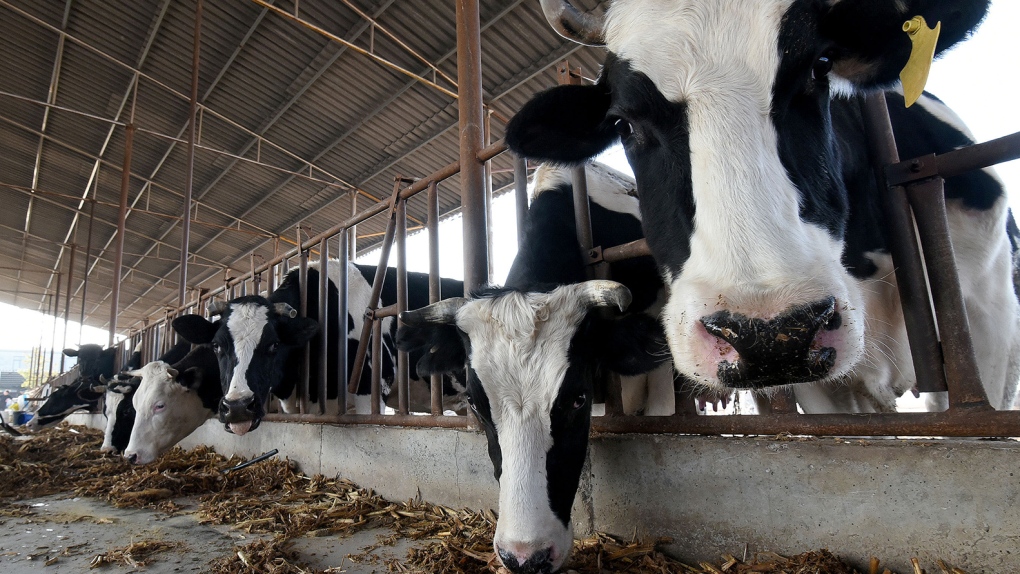
Widow looking for answers after Quebec man dies in Texas Ironman competition
The widow of a Quebec man who died competing in an Ironman competition is looking for answers.
Chinese scientists have successfully cloned three "super cows" that can produce an unusually high amount of milk, state media reported, hailing it as a breakthrough for China's dairy industry to reduce its dependence on imported breeds.
The three calves, bred by scientists from the Northwest University of Agricultural and Forestry Science and Technology, were born in the Ningxia region in the weeks leading up to the Lunar New Year on January 23, the state-run Ningxia Daily reported.
They were cloned from highly productive cows from the Holstein Friesian breed, which originated in the Netherlands. The chosen animals are capable of producing 18 tons of milk per year, or 100 tons of milk in their lifetimes.
That is nearly 1.7 times the amount of milk an average cow in the United States produced in 2021, according to the U.S. Department of Agriculture.
The first of the cloned calves was born on December 30 by cesarean section due to its relatively large size of 56.7 kilograms (120 pounds), an official in the city of Wulin in Ningxia told the state-run Technology Daily.
The scientists made 120 cloned embryos from the ear cells of the highly productive cows and placed them in surrogate cows, according to the Technology Daily.
Jin Yaping, the project's lead scientist, called the birth of the "super cows" a "breakthrough" that allows China to preserve the very best cows "in an economically feasible way," the state-run newspaper Global Times reported.
Only five in 10,000 cows in China can produce 100 tons of milk in their lifetimes, making them a valuable resource for breeding. But some highly productive cows are not identified until the end of their lives, making it difficult to breed them, Jin said.
As much as 70% of China's dairy cows are imported from overseas, according to the Global Times.
"We plan to take two to three years to build up a herd comprised of over 1,000 super cows, as a solid foundation to tackle China's reliance on overseas dairy cows and the issue of the risk of being 'choked' [by supply chain disruptions]," Jin told the newspaper.
In many countries, including the United States, farmers breed clones with conventional animals to add desirable traits, such as high milk production or disease resistance, into the gene pool.
China has made significant progress in animal cloning in recent years.
Last year, a Chinese animal cloning company created the world's first cloned Arctic wolf.
In 2017, Chinese scientists said they produced cloned cattle with increased resistance to bovine tuberculosis, a risk to cattle in many countries.

The widow of a Quebec man who died competing in an Ironman competition is looking for answers.
Former NDP leader Tom Mulcair says that what's happening now in a trash-littered federal park in Quebec is a perfect metaphor for how the Trudeau government runs things.
The world is seeing a near breakdown of international law amid flagrant rule-breaking in Gaza and Ukraine, multiplying armed conflicts, the rise of authoritarianism and huge rights violations in Sudan, Ethiopia and Myanmar, Amnesty International warned Wednesday as it published its annual report.
A photographer who worked for Megan Thee Stallion said in a lawsuit filed Tuesday that he was forced to watch her have sex, was unfairly fired soon after and was abused as her employee.
Facing pushback from physicians and businesspeople over the coming increase to the capital gains inclusion rate, Prime Minister Justin Trudeau and his deputy Chrystia Freeland are standing by their plan to target Canada's highest earners.
The Senate passed legislation Tuesday that would force TikTok's China-based parent company to sell the social media platform under the threat of a ban, a contentious move by U.S. lawmakers that's expected to face legal challenges.
People living near a wildfire burning about 15 kilometres southwest of Peace River are being told to evacuate their homes.
The U.S. Senate has passed US$95 billion in war aid to Ukraine, Israel and Taiwan, sending the legislation to President Joe Biden after months of delays and contentious debate over how involved the United States should be in foreign wars.
A Winnipeg man said a single date gone wrong led to years of criminal harassment, false arrests, stress and depression.

The giant stone statues guarding the Lions Gate Bridge have been dressed in custom Vancouver Canucks jerseys as the NHL playoffs get underway.
A local Oilers fan is hoping to see his team cut through the postseason, so he can cut his hair.
A family from Laval, Que. is looking for answers... and their father's body. He died on vacation in Cuba and authorities sent someone else's body back to Canada.
A former educational assistant is calling attention to the rising violence in Alberta's classrooms.
The federal government says its plan to increase taxes on capital gains is aimed at wealthy Canadians to achieve “tax fairness.”
At 6'8" and 350 pounds, there is nothing typical about UBC offensive lineman Giovanni Manu, who was born in Tonga and went to high school in Pitt Meadows.
Kevin the cat has been reunited with his family after enduring a harrowing three-day ordeal while lost at Toronto Pearson International Airport earlier this week.
Molly Knight, a Grade 4 student in Nova Scotia, noticed her school library did not have many books on female athletes, so she started her own book drive in hopes of changing that.
Almost 7,000 bars of pure gold were stolen from Pearson International Airport exactly one year ago during an elaborate heist, but so far only a tiny fraction of that stolen loot has been found.
 Workers feed cows at a dairy farm in Handan, Hebei province, China, in November of 2021. (Hao Qunying/Costfoto/Future Publishing/Getty Images)
Workers feed cows at a dairy farm in Handan, Hebei province, China, in November of 2021. (Hao Qunying/Costfoto/Future Publishing/Getty Images)